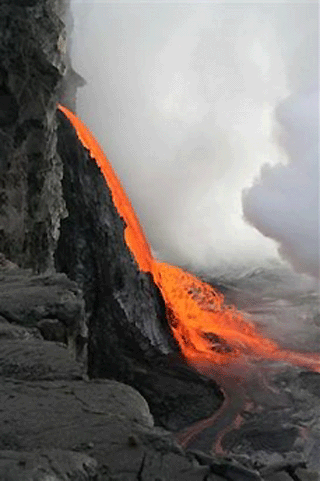|
44 acres of coastline collapses in Hawaii
(AP)
Updated: 2005-12-03 09:13
About 44 acres of coastline collapsed into the ocean this week, setting loose
a glowing stream of lava that shot out from the newly exposed cliffside 45 feet
above the water.

In this photo
provided by the U.S. Geological Survey's Hawaiian Volcano Observatory, the
collapse of 44-acres, (17.6-hectares) at Hawaii Volcanoes National Park is
seen falling into the ocean Monday, Nov. 28, 2005, exposing a 60-foot
cliff and a 6-foot in diameter stream of lava shooting from the cliff
face. The glowing lava has since formed a ramp of new land as it continues
to pour out into the ocean sending up a tower of steam. The collapse of
solidified lava and sea cliff is the largest since Kilauea Volcano began
its current eruption in 1983. [AP] |
|
The plume, 6 feet in diameter, sent up a tower of steam as it hit the water
and began forming a ramp of new land.
The collapse of solidified lava shelf and sea cliff Monday was the largest
since Kilauea Volcano began its current eruption in 1983.
Jim Kauahikaua, scientist-in-charge of the U.S. Geological Survey's Hawaiian
Volcano Observatory, said a collapse warning was issued in June because the
shelf had become large and had formed cracks. Large collapses had happened in
the area before.
Rumblings tipped scientists to Monday's collapse, which took about 4 1/2
hours. Even at that relatively slow pace, the effect was spectacular.
"The cliff just caved away like a glacier," said park spokesman Jim Gale. "It
just sheared off that old wall. There's this gigantic steam plume and you see
the red just falling down �� an incredible fire hose display."
The collapse sent out globs of lava and head-size boulders. Sheets of
volcanic glass called limu o Pele, after the Hawaiian goddess of fire, and thin
strands of volcanic glass known as Pele's hair were found 1,800 feet
inland.
|